![[Spectrum]](./images/spectrum_roundel.png)
Feel free to download
this logo (for strictly non-commercial use).
Please credit and link back to this page.
DO NOT hot link to the image directly. Sites routinely requesting this image will be blocked, or redirected.
![[Spectrum]](./images/spectrum_roundel.png)
Feel free to download
this logo (for strictly non-commercial use).
Please credit and link back to this page.
DO NOT hot link to the image directly. Sites routinely requesting this image will be blocked, or redirected.
For all the childhood entertainment, and for the dreams and adventures of the mind, and for being a ground-breaker - albeit a grudging one - we salute you!
Gerry Anderson
14 April 1929 - 26 December 2012
Requiescat In Pace
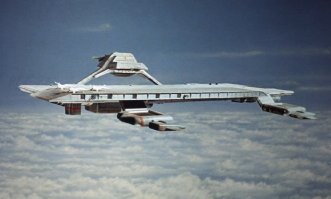
Welcome. To have found this page, then you must almost certainly have been looking for it, or something like it. It's not an easy page to just stumble on. Like Cloudbase it just sits quietly, largely unseen, hidden behind the clouds. I don't make a big thing about it, because - well there's not a lot to make a big thing about. This page really represents little more than my personal remarks written for my own satisfaction.
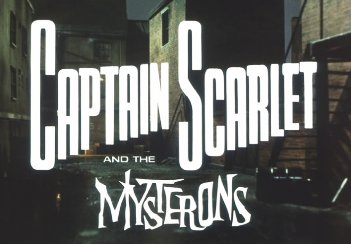
"Captain Scarlet" (full title "Captain Scarlet and the Mysterons") is a children's television "puppet" show made in 1967 by Gerry Anderson, and it has been my favourite television programme for as long as I can remember. Anderson undoubtedly is known best for having made "Thunderbirds" immediately prior to it, which was so successful that it resulted in two full-length feature films: Thunderbirds Are GO and Thunderbird 6, although they were neither block-busting successes. And don't let the word "puppet" mislead you into thinking that these programmes were insignificant nonsense. In many ways Anderson and his colleagues at the time were responsible for things that we now take for granted in modern entertainment. Derek Meddings, the man responsible for making Christopher Reeve fly in Superman and its sequels, and the brain behind some of the most spectacular special effects in Hollywood (such as in the James Bond films Live and Let Die and The Spy Who Loved Me, or in Batman), developed his skills whilst working alongside Anderson on the puppet shows. (Sadly Meddings died in 1995, and yet another Bond film, Goldeneye, is dedicated to his memory.) The advanced techniques that went into building the electro-mechanical heads for the puppets used to lip-sync the dialogue were arguably the precursor to the complex animatronics now so common in the likes of The Terminator.
Anderson always claimed that his ambition was to go into "real" television (which can probably be translated as "mainstream adult drama"), and that ending up in children's TV was merely a disappointing accident. It is a shame that he should have dismissed his contribution to TV history so eagerly because his programmes were of a much superior quality, and represent something uniquely British in spite of their global appeal. What is more, he demonstrated that producing television for children was no excuse for producing television that looked as if it had been made by children. Whilst the early puppets were no different from most others, his skilled team rapidly absorbed technology and evolved something uniquely characteristic, and never really matched since. The narratives, though simple and flawed, were dramatic. In some respects he set the gold standard for quality innovative children's entertainment, and in my view that standard has never been surpassed. In many ways the programmes' concepts were themselves staggeringly advanced. Things we now consider common-place were depicted without hesitation, or drifting too far into the realms of fancy. The story-lines and visual effects introduced children to imaginative realms which they'd never before seen. There were plot holes the size of your average oil-tanker, and some of the dialogue truly cringe-worthy to the adult ear, yet for sheer compulsion there was nothing like them. They fired the imagination. And for some strange reason, Anderson's work still holds a great attraction not only for today's children, but also for their parents, the adults grown up from his first child audiences, and in some instances even their parents.
Anderson's independent production work began, after his early years in the industry as an editor and director, with children's puppet shows commissioned for the fledgling commercial television network in the UK in the 1950s. These early programmes ("The Adventures of Twizzle" and "Torchy the Battery Boy" in 1957, and "Four Feather Falls") in 1960, were unashamedly traditional string puppetry. The evolution of the particular style recognisable as the influence of the Andersons (because of course, his wife Sylvia was also a big part of the development during their heyday) really began with "Supercar" also in 1960, "Fireball XL5" in 1962, and "Stingray" in 1963, which reduced the evidence of the puppetry and started relying on action and vehicles, but without any particular subtlety.
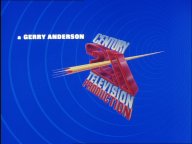
The Anderson heyday was undoubtedly broadcast in the "Century 21" days in the latter half of the 1960s, peaking with his best known work - "Thunderbirds" produced in 1964 and 1965 - and of course "Captain Scarlet" in 1967, and its successor "Joe 90" in 1968. In both of the latter the technology of the time finally allowed the puppets to take on almost perfectly human proportions.
Following Joe 90, production efforts created decidedly mixed results. Experiments with a hybrid formula of part live action and part puppetry in "Secret Service" (which is so under-exposed it doesn't even have an IMDb entry) never received acclaim, and anyone who's seen it knows why. 1969 saw the release of the largely live action film Doppelgänger (aka Journey to the Far Side of the Sun), which as with the Thunderbirds films before it, performed very poorly commercially. Commercial failure notwithstanding, it set the direction of future production, and the Anderson team returned the following year (with several of the film's props and vehicles, and a similar visual style) to the medium they knew best - TV. "UFO" was set then a mere 10 years into the future (and now more than 25 years in our past) which was a return to form but failed to attract sufficient interest to justify the further series that had been planned. 1972 saw something of a departure with the Anderson camp making a very uncharacteristic (for them) series called "The Protectors", following a fashionable formula of the time depicting the adventures of a contemporary free-enterprise crime- and espionage-busting trio, comparable with other members of the genre and reasonably successful, but strangely not leading on to more similarly conventional work. The middle years of the 1970s saw two series of "Space 1999" (some of the early production design of which is rumoured to have been derived from an unmade second series of "UFO"), but the formula rapidly became tired. Some time later after "Space 1999" had fizzled out and after a noticable hiatus, and a number of failed projects, Anderson was tempted to team up with Christopher Burr to form Anderson-Burr Pictures, which in 1983 made "Terrahawks". This was based once more around puppets, but this time in the form of what can only be described as foam glove-puppets. The programme was in many ways a combined spoof of its forerunners - particluarly Thunderbirds and Captain Scarlet - whilst at the same time taking a poke at other contemporary fads - most notably the use of a verbal code system similar to the "10 code&code; that was prevalent on the newly legalised (in the UK) Citizens' Band radio (or CB, as it is commonly known). Whilst superficially a lightweight (and largely nonsensical) space adventure aimed at a young child audience, it was sufficiently laden with sly satirical references and hidden jokes to recapture the same young adult audience that had grown up with its forebears. Similar puppetry techniques went on to be used in the bizarre and surreal film noire pastiche of "Dick Spanner, P.I.", which was intentionally aimed at an older and more sophisticated audience. Since then, there have been new production companies and series periodically, but none ever seem to really capture an audience the way the earlier programmes did, nor reach the same level of commercial stability. Perhaps these days there are just too many special effects and fancy production values to compete with.
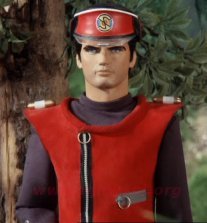
Captain Scarlet was, in many ways, Anderson's best (although it should be noted that in fact it was mainly Sylvia's doing when it came to day to day production, Gerry being tied up largely with parallel work on the second Thunderbirds film). I was of an age when it was first broadcast where it must have left a deep impression. Thunderbirds was unquestionably my very first favourite TV programme. Before that I was too young to understand the question, let alone answer it. Even during the first run of Captain Scarlet, I enjoyed it but was still fanatical about its predecessor, and later came to be very taken with Joe 90.
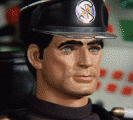
It was only after Captain Scarlet finished and was repeated only once, that it dawn on me that I missed it. In fact, until seeing it as an adult I didn't even know there were episodes I'd missed as a child. With Thunderbirds that simply hadn't happened - if it was on, I watched it. Perhaps it was the fact that technology had allowed the production of naturally proportioned puppets. Perhaps it was the changing interests and mental patterns of the growing child. I don't know. As I entered my teens Captain Scarlet became a quietly smouldering obsession, so much so that when it was first re-broadcast in the 1980s when I was back home shortly after finishing University, my father woke me with the news it was back on that very first Saturday morning, five minutes before it was due to start. (How I didn't already know about it I will never know, but it doesn't seem to have been given anything of a fanfare. Sheer luck that he was watching at the time. And a measure of my father that he was happy to indulge such a childish obsession in his young adult son.) By the time he had returned to the living room, I was already there, with a tape in the video recorder with my finger hovering over the record button. It was the first time that I remember actually seeing the very first episode, and I was already a young adult. In the 1990s something else came along that grabbed my attention - "Babylon 5" - which whilst it became something of an obsession in its own right until the disappointment of the final season, it has never surpassed my love of Captain Scarlet.
Gerry Anderson has never fully gone away. Certainly there is no prospect of his programmes fading into obscurity. Since its initial break of about 10 years, between the late 1960s and the mid 70s, Thunderbirds never seems to have been off our screens for more than a year at a time. In the days when ITV was split into regional franchises, it was usually to be found in the Saturday morning broadcasts of one company or another, and more recently was adopted by the BBC and shown on BBC2 in the early evening slot, following the remastering for the DVD release. Captain Scarlet has been resurrected more than once (the first, as already mentioned, in the mid 1980s when some episodes were rebroadcast on ITV's Saturday morning family TV, again in the late 1980s when it was cut, very annoyingly, into segments and used as bait to attract a nostalgic adult audience to ITV's fledgling overnight "Night Network" after the pubs closed on Friday night, and then again in the 1990s by BBC for its early evening children's entertainment slot on BBC2). With the advent of DVD most of the major series seem to be being dusted off and re-mastered, with new stereo sound-tracks (which don't always work) and digitally enhanced visual effects (which frequently don't work). In my view these things are products of their time, and whilst there's no harm in cleaning up noise from the originals, they shouldn't have been "improved". It spoils the experience.
More recently, a live-action Thunderbirds film came out summer 2004, this time without Gerry Anderson's active participation, directed by Jonathan Frakes (formerly of Star Trek Next Generation fame in the the role of Cmdr. Will Riker). I have not seen it, but the publicity alone suggest it was a complete and utter mess, with little but token similarity to its inspiration. According to Gerry during a personal appearance a few years ago his presence on the production staff would have been token, with no real creative control, which was not to his liking. Given Hollywood's all too obvious talent for completely losing the original flavour in their re-inventions of old favourites I don't blame him.
So where now? Well, believe it or not, 38 years after the original, a new series of Captain Scarlet (imaginatively titled "Gerry Anderson's New Captain Scarlet") was produced using state-of-the-art technology. Gone are puppets and models on wires, and painted backgrounds, and in comes CGI (computer generated imaging) animation (dubbed "Hypermarionation", which can only be Anderson taking a tongue-in-cheek poke at himself). Production numbers suggest it was filmed administratively as two series of 13 episodes, but it has has aired twice as one complete series during 2005 in ITV's Saturday morning children's show "Ministry of Mayhem", as their final major item starting at 11am. Best thing about it is that (unlike the Thunderbirds movie mentioned below) it has Gerry Anderson firmly at the helm, and whilst updated for the present day's more sophisticated child audiences it is a worthy re-interpretation of its original form for the Matrix/Buffy generation. As a die-hard fan of that original, I am surprised how much I enjoy this new version. So what if I'm 50? No reason I should not enjoy it. So great is the interest in the Anderson's work that news of the remaking of the series hit the mainstream news in this article and this one on the BBC's news web site.
Sadly, although on the face of it the series was well received and the prospects looked promising for further series, as happened so often with Gerry's work, no follow-on was ever commissioned. The official web site for the series at www.captainscarlet.com (and another at www.captainscarlet.tv, which used ot be quite active) went very quiet for a long time, and the .com has now been relinquished by Carlton and registered in Germany, apparently for a fan site. Shortly before the official confirmation rumours emerged, alleged to have come at least in part from within the production team itself, suggesting that the future looked bleak.
Given the amount of effort that went into (several years of) pre-production work on the animation facilities, and the general quality of the end product, it is unfortunate if this goes the way of most of Gerry Anderson's productions, which traditionally fail to get more than a single series. I can't help but wonder if this is in part because once he gets a format to "work" successfully in production, Gerry himself gets bored and loses interest. It's a conclusion at least supported by the fact that he is now understood to be using similar CGI technology in a new project entitled "Light Speed" (or "Lightspeed", or "LightSpeed", depending on where you look).
Film success has always eluded Gerry Anderson. The reasons behind their respective failures are open to debate, but a major factor in the case of the second Thunderbirds film has to be that it was simply not up to the standard set by the television series (or the preceding film). It is often been suggested that Doppelgänger was simply too complex for audiences at the time, and that the editing was confusing. Whatever the reasons, the failure of the films has to be seen as a mixed blessing - a disappointment for Gerry and the production teams, but a bonus for the fan. Had any of the three attempts at full-length features been a box-office success, then British television would have lost one of its most iconic producers. There would have been no Captain Scarlet; no Joe 90; no UFO; no Space 1999; no Terrahawks. He, in partnership with Sylvia for much of the time, and those they presided over in the 1960s and 70s left such a mark on the television history that their influence can be still be seen in modern television and film the world over, and they have left us with a legacy like no other. It is my own personal belief that a good deal of the reputation that British television has for quality around the rest of the world can be traced back to Gerry Anderson, if not through his own work, then in the influence it had on quality in the industry. Although the majority of the work was ostensibly for children, it has always attracted an adult audience, and with the emphasis on production quality it set a standard that contemporary producers of more mature programming - such as the prolific team of Dennis Spooner and Monty Berman - had to live up to.
Possibly the single most enduring consequence of the original Thunderbirds was the formation of a real life International Rescue Corps.
One of those annoying questions to which you can never remember all the
answers:
Q: How many Angels were there, and what were their operational code
names?
A: 5. Destiny, Harmony, Rhapsody, Symphony, and Melody. (So
just how does "Destiny" get in there? Beats me.)
As long as I have had Internet access (now nearing 20 years) my personal e-mail has been sent with the following "signature" text appended:
This is the voice of the Mysterons... ... We know that you can hear us Earthmen "Lieutenant Green: Launch all Angels!"
This is something of a nerdish Anderson fan's joke. The text is known in the jargon as a "sig". Lieutenant Green's response to the command to launch the Angels would have been "S.I.G.", an acronym for "Spectrum is Green". The link occurred to me in seconds the very first time I sent an e-mail, and amused me, and I've never been moved to change it. (I told you it was nerdy.)
And nothing. If you've found this to be of interest, look back later. There may be changes or additions, there may not. But that's your lot for now.
Of course it's all so interesting you must surely want to read the author's main page, if you haven't already, to see what else there is to discover.
No? Well how about the site's welcome page then?
This page copyright © 1996..2013 - Gulraj Rijhwani
<raj@rijhwani.org>
Last updated September 23, 2016.